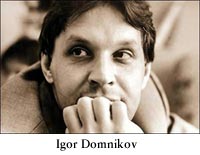As promised in the RU-UA War thread a few days ago, a little more on the Russian nuclear doctrine.
A couple of posts above, I posted a few Russian expert opinions on the subject from a Kommersant article. Since then, Kommersant posted another rather wide interview with another Russian expert, who is one of the hawks (read a nut), but has more influence than any of the people in the previous article (perhaps why an interview instead of brief opinion). This man is Sergey Karaganov.
Политолог Сергей Караганов — об изменении политики России по применению ядерного оружия

www.kommersant.ru
People can read the entire article via google translate, but I will outline his ideas in my own words and direct quotes.
Sergey Karaganov
A well-known political scientist, honorary chairman of the Presidium of the Council on Foreign and Defense Policy, scientific director of the Faculty of World Economy and World Politics of the Higher School of Economics. Chairman of the Editorial Board of the journal "Russia in Global Politics".
- He doesn’t know what wording will be included in the amended doctrine, but he surely can make some suggestions. First, however, he comments on the current doctrine.
- The current doctrine is completely irresponsible. It reeks of the 60-70s. It practically excludes the most powerful argument in Russia’s military and foreign policy arsenal. He thinks it is not only wrong, but also immoral in the highest degree. Millions of people have died in days past for this political instrument, the nuclear shield. It is rather a history of great heroism and selflessness during the war, hunger, etc. But, he thinks, Russia had suddenly decided to forget about all that.
- Now is the time to declare that Russia will respond with a nuclear strike to any massive attacks/strikes on its territory.
- At the same time, there should be introduced a concept of “nuclear escalation” - basically, steps that would precede the nuclear strike to convince the potential or real enemy that Russia is ready to use nuclear weapons.
- The idea at core is that the doctrine should clearly reflect to all current and future opponents that Russia will use the nuclear arsenal at their disposal.
- Not only it is Russia’s responsibility to their citizens, who are currently dying at the frontline and civilians who are killed in peaceful cities, but to the entire world.
- If the nuclear deterrence is not reactivated, the world will drown in wars, which will undoubtedly lead to the use of nuclear weapons and the WW3.
- In order to avoid that, the nuclear factor must be intensified to convince Russia’s opponents that nuclear weapons will be used in any encroachment on Russian territory and citizens. He says that he “really contributed to such changes”.
- When asked why he thinks the current doctrine is outdated if the latest additions to it were signed only 4 years ago, he says that it is based on postulates, some of which weren’t Russian to begin with, from the last century. He also greatly blames himself for not expressing his great outrage publicly when the new document was revealed, but only expressing his opinion to a small circle of experts.
- Currently, it is anything but a doctrine: it is based on the illusions from the last century, a natural rejection of nuclear weapons. That is, however, understandable because of the human nature - who would want to use nuclear weapons?
- The interviewer here says that she hopes no one, to which he replies he more than understands that.
- The problem is that pacifists live because others fight for them and currently there are tens of thousand fighting for them and dying in the fields and if this continues, this dying will turn to the cities as well because the war will inevitably grow.
- Russia will continue draining itself on the so-called line of contact, spending gigantic resources, while competing with “half a hundred” countries whose economies are superior to Russia’s. Both, the former and the latter (draining and competing), will lead the country, that finally reached a certain level of prosperity and comfort, to a decline and possibly disintegration.
- Question is asked about the practical significance of the amendments to the doctrine and she mentions that the doctrine of 2010 had two scenarios for use of nuclear weapons, while amendments of 2020 brought it up to four.
- Karaganov says it will oblige their military to prepare for nuclear strikes. The “existential threat to the state” is too “ephemeral” of a scenario to even talk about it, a mockery of common sense.
- The current doctrine does not serve the function of deterrent and prevents the use of other very useful functions of the nuclear arsenal.
- Russia brought the matter to the point where the opponent is convinced that there are almost no circumstances that will trigger use of nuclear weapons.
- When talks of “tightening” the nuclear doctrine began about 1.5 years ago (in which he says he actively participated), there was a bit of reckoning in the west and talks of the need to avoid nuclear escalation at any cost.
- Europeans have completely lost their minds and forgot what war is, the Americans began treading much more carefully.
- The West is promoting the idea that Russia is not supported by the majority of the world, but China and other countries understand the logic behind Russia’s actions, including the motives behind amending its nuclear doctrine.
- Predictions and statements by the West about the countries from the world majority turning away from Russia due to tightening its nuclear doctrine is just an anecdote, psychological warfare.
- The interviewer says that Chinese were pretty clear in their statements that nuclear weapons should not be used and nuclear war should not be started.
- Karaganov says he somewhat understands this official position because strengthening the nuclear deterrence would not be in their interest because China is still weaker in this area.
- Statements signed by the “Nuclear Five” in 2022, about no winners in nuclear war and that it cannot be unleashed, are nothing more than some kind of intellectual mistake.
- From there it follows that any other type of war can be unleashed and they can destroy each other with any other weapons available to them, which is nonsense because then it was believed that there could be no war between nuclear powers.
- Today, nuclear NATO, led by the United States, is in full out war with Russia, using Ukrainian meat and if this madness doesn’t stop, they will start feeding others into the grinder.
- Nuclear weapons are first and foremost the weapons of peace and prevention of war.
- Russia was forced to adopt the current doctrine in the 90s, which paved the road for nonnuclear aggression around the world.
- It opened the road to NATO expansion because Russia has completely abandoned the nuclear factor as an instrument of the foreign policy, which was a crime.
- The interviewer says that in the statements of the “Nuclear Five” of Jan 3, 2022, they specifically stressed that confrontation of any kind between the nuclear states is not allowed.
- Karaganov agrees and says that this is a step in the right direction; however, Russia didn’t abandon its previous commitment (from the doctrine), which not only carries a pacifist message, but also unties the hands of other countries, whose arsenal of conventional weapons and economic might increases their chances of winning in interstate confrontation.
- The United States always was and always will be to use nuclear weapons first.
- While use of nuclear of weapons would lead to many innocent deaths, you have to convince your opponent that you are ready to use these weapons.
- Limited use of nuclear weapons will not lead to a total apocalypse and every country has plans of such “dosed” use in certain scenarios.
- United States always lied and continues to lie that their nuclear guarantees extend to its allies.
- It’s important to strengthen nuclear doctrine and Russian leadership needs to clearly state that they are ready to use nuclear weapons against NATO countries that support aggression in Ukraine.
- The list of such countries should be compiled by those responsible for such decisions.
- Burns (CIA) is a smart man but he (and the US) is bluffing when talking about the destructive strike with conventional weapons on the Russian forces in and around Ukraine if Russia uses nuclear weapons.
- If that were to happen, Russia would reserve the right for another strike, but on a much larger number of targets through out Europe.
- If they continue the escalation, Russia will be striking American bases in Nato countries and around the world, killing hundreds of thousands of American troops.
- The total war is not going to happen if they will know that Russia will use nuclear weapons.
- Russian opponents need to know this decision will be made by the president because this is his obligation before Russia, world, God.
- It has to be understood that it is the war of annihilation that they are waging against Russia and they won’t stop until Russia is completely demolished.
- The interviewer here says that she doesn’t understand why would Russia put itself in a corner (ie, inevitable use of nukes).
- Any nuclear strike has to preceded by a warning strike with conventional weapons.
- Next thing that Russia should do is strike targets in NATO countries that play a significant role in supplying Kiev regime and if that doesn’t stop them, we should go further (massive nuclear strike against the targets in Europe).
- The interviewer asks about the guarantees that both sides would stop at some moment and prevent destruction of the planet.
- To that, Karaganov says: “There are guarantees at Rossgosstrah (government insurance agency), as you know. What I can guarantee to you is that if we do not reactivate our nuclear deterrence, we are not going to escape humanity’s self destruction, but we could be the first ones to go”.





